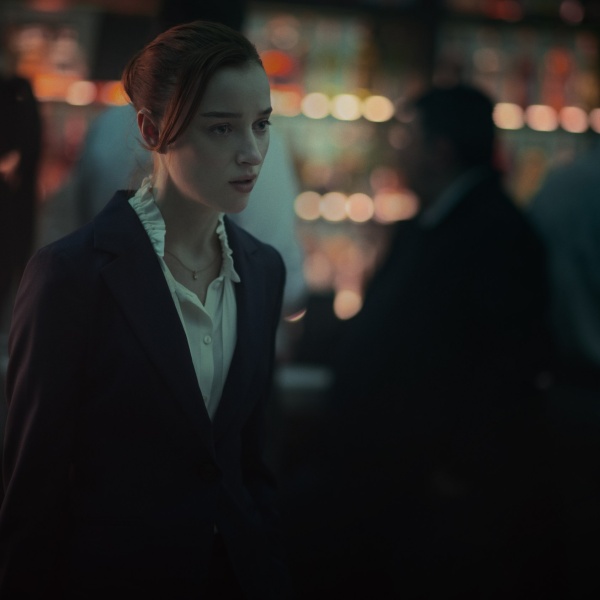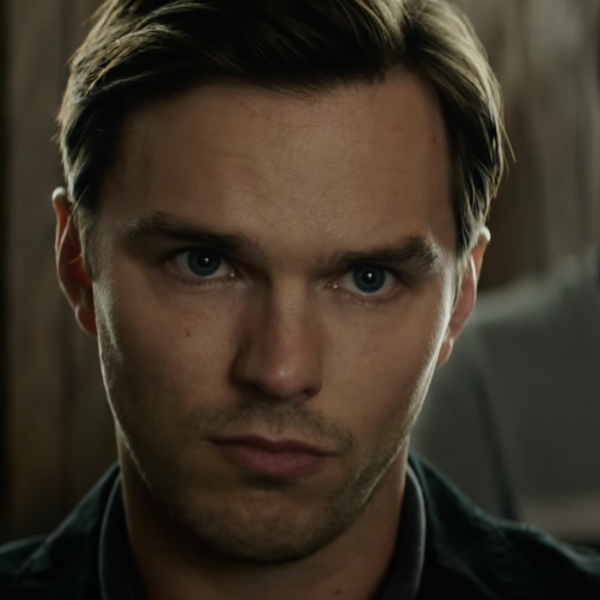 In the stark, humorless world of “Priest,” directed by former visual effects dude Scott Stewart and based on a popular Korean comic book by Min-Woo Hyung, violent fights break out almost all the time. Stewart, who also helmed last year’s tedious “Terminator” rip-off “Legion,” films these fights with sub-“Matrix” flourishes of extreme slow-motion or exaggerated physical performances by the actors (chief among them Paul Bettany). But the most violent clash in “Priest” is probably the way in which a long litany of science fiction and horror clichés rattle and clang against one another; it’s not a movie, it’s a checklist.
In the stark, humorless world of “Priest,” directed by former visual effects dude Scott Stewart and based on a popular Korean comic book by Min-Woo Hyung, violent fights break out almost all the time. Stewart, who also helmed last year’s tedious “Terminator” rip-off “Legion,” films these fights with sub-“Matrix” flourishes of extreme slow-motion or exaggerated physical performances by the actors (chief among them Paul Bettany). But the most violent clash in “Priest” is probably the way in which a long litany of science fiction and horror clichés rattle and clang against one another; it’s not a movie, it’s a checklist.
After a brief, animated prologue, which is about the liveliest part of the whole movie (and even that seems like it was borrowed from the storyboards for a similar sequence in “Hellboy II: The Golden Army”), meant to bring us into the “world” of the movie, really just confuses. Basically, humankind and vampires have been fighting with each other since the dawn of time, using increased technological methods to get back at each other. At some point, “priests” were introduced and the war was essentially “won.” What are the priests and what makes them so goddamn special? Well, that’s hard to say. They have supernatural abilities, or something (hence all the aforementioned leaping), and every one of them gets a dopey cross tattoo scrawled on their face (maybe it looked cooler in the comic book). But besides that, it’s not really clear.
 Apparently everyone lives in one giant city, which is reminiscent of both “Blade Runner” and “Judge Dredd,” a film that looks like “Metropolis” in comparison to this one, and the populace is under the control of the church. Around the time you see people gathering in the megalopolis streets for their daily prayer, delivered by a pope-ish Christopher Plummer (in a ridiculous robe), you might start feeling something akin to hope. “Maybe this will be some kind of oversized satire, tackling the dangerous of a theocratic society and the group-think of organized religion run amok?” You’ll think to yourself. And, since you’re bright and optimistic, you’ll continue: “Parallels can easily be drawn to the kind of religious fervor that seems to be gripping whole swaths of America today – this is going to be great!”
Apparently everyone lives in one giant city, which is reminiscent of both “Blade Runner” and “Judge Dredd,” a film that looks like “Metropolis” in comparison to this one, and the populace is under the control of the church. Around the time you see people gathering in the megalopolis streets for their daily prayer, delivered by a pope-ish Christopher Plummer (in a ridiculous robe), you might start feeling something akin to hope. “Maybe this will be some kind of oversized satire, tackling the dangerous of a theocratic society and the group-think of organized religion run amok?” You’ll think to yourself. And, since you’re bright and optimistic, you’ll continue: “Parallels can easily be drawn to the kind of religious fervor that seems to be gripping whole swaths of America today – this is going to be great!”
But then you remember that Paul Verhoeven didn’t direct this movie; some chump named Scott Stewart did. And Scott Stewart is an fucking awful director. Which means that instead of getting into any kind of meaningful or philosophical engagement with the material, which seems to positively bristle with possibilities, we’re thrown into a mishmash of well-worn and oh-so-dull sci-fi clichés. What this means is that we get a scene in which a frontier colony is attacked by vampires, where one of the settlers is played by “True Blood’s” chief bloodsucker Stephen Moyer. And the movie is so humorless and trite that the moment can’t even carry a winky, meta-textual kick. Instead, you’re just wondering why these people in the far-flung future are wearing old-timey western clothes? (The answer: BECAUSE.)
 The chief narrative engine involves the Priest (Bettany) going out to the outlands to retrieve a young girl (played by Phil Collins’s daughter) who has been imprisoned by some nasty vampires. For some reason, after the vampire-human conflict was over, the super-religious society shunned the priests even though they were instrumental in the humans’ victory. So the Priest has to prove himself to the church that abandoned him while warning the people that the vampire menace is still real. “If you turn your back on the church, you turn your back against God,” Plummer gravely intones, but all you can think is riiiiiiiight.
The chief narrative engine involves the Priest (Bettany) going out to the outlands to retrieve a young girl (played by Phil Collins’s daughter) who has been imprisoned by some nasty vampires. For some reason, after the vampire-human conflict was over, the super-religious society shunned the priests even though they were instrumental in the humans’ victory. So the Priest has to prove himself to the church that abandoned him while warning the people that the vampire menace is still real. “If you turn your back on the church, you turn your back against God,” Plummer gravely intones, but all you can think is riiiiiiiight.
So much of the movie is a pseudo-western, which means that in addition to all the science fiction clichés (the ashy cityscape, the futuristic motorcycles, the fact that, hundreds of years from now, people just talk in metaphorically messy sophisms) and horror clichés (the monsters look like something James Cameron drunkenly doodled on a cocktail napkin), we get western clichés too! That means there’s “frontier towns” and a heavy emphasis on a passing railroad system. Yes, in a movie set in the technologically advanced future, its chief preoccupation is one that Alfred Hitchcock shared decades ago: the train.
 The action sequences are muddy and unconvincing, the monsters (which have a gooey vaginal slit for a mouth and look like those blind moles that live underground) even moreso. (The piss-poor last minute 3D conversion only means things are darker and harder to decipher.) The villain is a former priest-turned-vampire played by Karl Urban, displaying none of the wit that made him one of the breakout stars of JJ Abrams’ “Star Trek” reboot. He still has his face tattoo and his ensemble has been augmented with a hat that has an impossibly wide brim, making him look less like a human being and more like a Japanese cartoon character. It’s not exactly threatening.
The action sequences are muddy and unconvincing, the monsters (which have a gooey vaginal slit for a mouth and look like those blind moles that live underground) even moreso. (The piss-poor last minute 3D conversion only means things are darker and harder to decipher.) The villain is a former priest-turned-vampire played by Karl Urban, displaying none of the wit that made him one of the breakout stars of JJ Abrams’ “Star Trek” reboot. He still has his face tattoo and his ensemble has been augmented with a hat that has an impossibly wide brim, making him look less like a human being and more like a Japanese cartoon character. It’s not exactly threatening.
But most befuddling of all, out of the seemingly limitless possibilities when you are thinking about a movie as asinine, pointless, and ploddingly lifeless, is what happened to Paul Bettany. He used to be good. Like, really, really good. Like his name being included in a cast meant that the movie was probably a little better for it. Just rewatch “Master and Commander” to see how amazing he can be (not that you need an excuse to watch that again). His choices, lately, have been dicey at best – he was the murderous albino monk in “The Da Vinci Code,” and then teamed with Stewart for last year’s “Legion,” in which he played an Uzi-packing angel. That movie might have given him more range, or at least put him in a slightly more interesting leather duster. In “Priest,” for which he turned down Colin Firth‘s Oscar-winning role in “The King’s Speech,” in possibly the single worst decision ever taken by an actor, all he has to do is scowl (which, hilariously, makes his face tattoo ripple in unconvincing ways), throw punches, and grumble menacingly. Bettany’s career is a good metaphor for “Priest,” though – it once showed so much promise but ended up being a broken down disappointment, more heartbreaking for what it could have been than what it is. [F]





